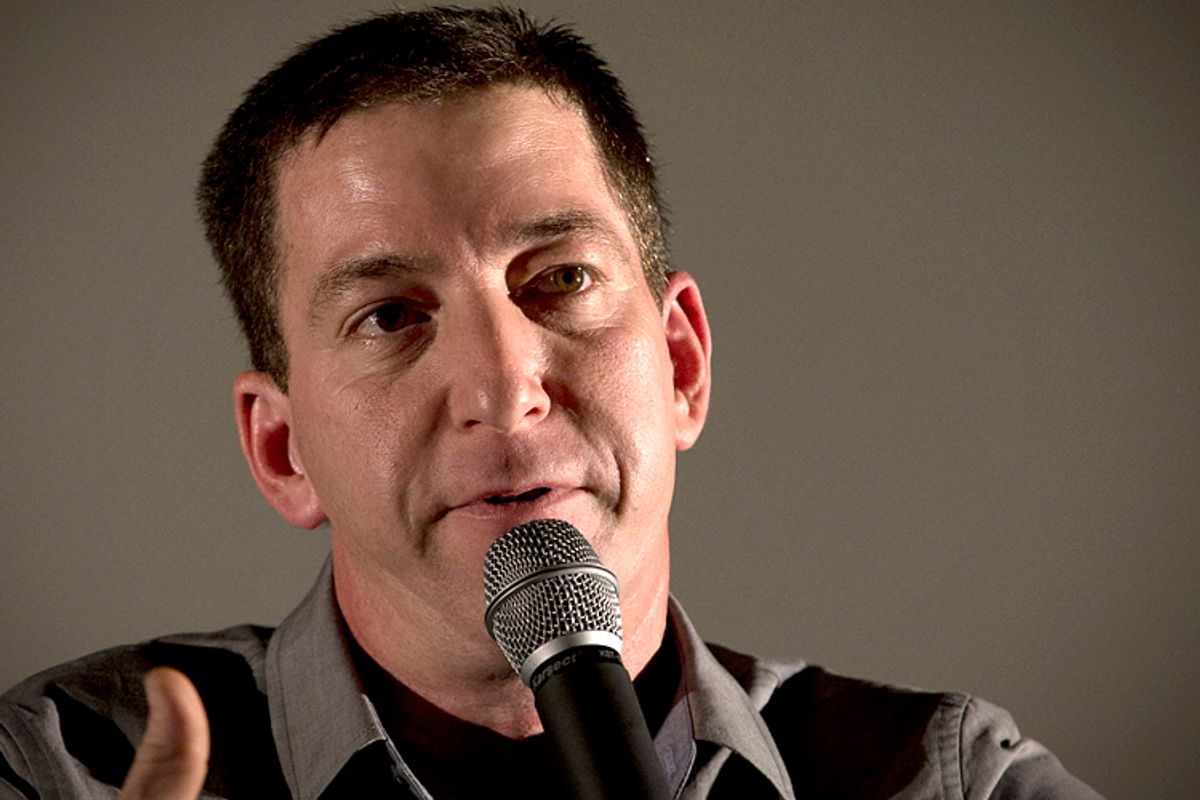When big-name public figures and Edward Snowden critics first started suggesting Glenn Greenwald and other writers who'd published his surveillance disclosures might be in legal jeopardy, Greenwald assumed that both the clamor and the actual risk to journalists would quickly subside, and eventually disappear.
That was about six months ago. Today, Greenwald believes he miscalculated. In an exclusive interview Wednesday he said that the ominous rhetoric directed at him has actually escalated. It's discouraged him from visiting the United States, where he still has strong family and professional ties. And though he intends to reenter the country sooner rather than later, he'll do so despite the fact that he believes he faces a much greater risk of detention than most of the other journalists who have access to some or all of Snowden's files.
"As the story kind of went on I thought the prospect of something happening to the journalists would dissipate to zero. I actually think that the risk is higher than it's ever been," Greenwald told me. "My parents are getting older, my nieces [live there] -- none of that is something I'm going to go home for now ... I had a foundation that wanted to sponsor and pay for and market aggressively a six-city speaking tour to talk about the NSA story and the revelations. I would have completely loved to have done it … on the assurance that nothing would happen. And because we couldn't get it from the U.S. government, I had to cancel."
When we last spoke in August, Greenwald was cognizant of the risks he'd face if he visited the United States, but he was also pointedly defiant. "I take more seriously the Constitution’s guarantee of a free press in the First Amendment," he said at the time. "So I have every intention of entering the U.S. as soon as my schedule permits and there’s a reason to do so.”
Today he remains defiant -- "I'm going to go back to the U.S. for many reasons, but just the fucking principle is enough ... On principle I'm going to force the issue" -- but recent comments by Mike Rogers, the chairman of the House Intelligence Committee; James Clapper, the director of national intelligence; and others have intensified his doubts.
Rogers compared Greenwald to a thief selling stolen material. Clapper appeared to suggest that Greenwald and other NSA reporters are "accomplices" to Snowden's crimes. In each case the innuendo sidesteps the unseemly appearance of targeting journalists by attempting to distinguish the work of the journalist from journalism.
Questioning whether Greenwald aided and abetted Snowden has gone mainstream. And though a number of other journalists have access to classified documents Snowden downloaded and left the country with -- including others who, like Greenwald, have used them as the basis for freelance writing -- Greenwald believes he and his reporting partner Laura Poitras face unique threats for four reasons.
1) Greenwald and Poitras went to Hong Kong to meet with Snowden and discuss the documents, "for almost two weeks -- six days before the first story came out and every day after that until he went into hiding."
2) They were in contact with Snowden, and perhaps under surveillance themselves, at the time that he went into hiding and have remained in very regular contact with him since then.
3) Greenwald has paired his reporting with forceful advocacy: "vehemently condemning the U.S. government, defending Snowden."
4) Unlike U.S.-based reporters, he and Poitras have been freelancing stories at publications all around the world.
"Everybody I've talked to, including experienced lawyers -- nobody has said 'this is crazy,'" Greenwald added, stipulating that he doubts he'd actually be charged with anything -- less than 50 percent chance of that in his mind. Nevertheless, "Everybody recognizes that there's some risk."
A Justice Department spokesman referred me to these inconclusive November comments by Attorney General Eric Holder. "[O]n the basis of what I know now, I’m not sure there is a basis for prosecution of Greenwald.”
On Tuesday, BuzzFeed reported that Greenwald and other leading NSA reporters are expected to win a Polk Award this year. Greenwald, who used to write for Salon, wouldn't confirm the accuracy of that report, but he did say he would likely return to the United States to accept a prestigious journalism award, should he win one.
The Polk Awards will be conferred in April.

Shares